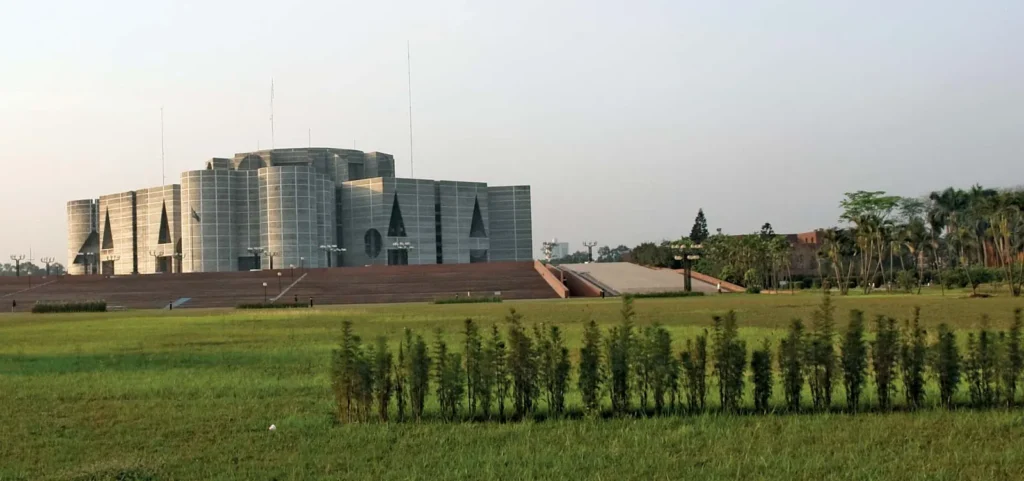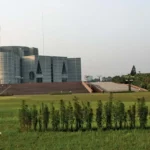On June 1, 2023, Bangladesh’s Finance Minister AHM Mustafa Kamal presented the national budget for the fiscal year 2023-24. This ambitious budget, amounting to nearly Tk 7.61 trillion, aims to bolster economic growth, infrastructure development, and social welfare, all while steering the country towards becoming a “Smart Bangladesh.” The budget represents a 15% increase from the previous fiscal year’s revised budget and outlines significant allocations across various sectors. Here’s a detailed look at the key components and implications of the Bangladesh Budget 2024.
Key Figures and Economic Targets
Budget Size and Deficit
The total budget for Bangladesh Budget 2024 is set at Tk 7.61 trillion. The government has set a revenue target of Tk 5.04 trillion, with the National Board of Revenue (NBR) tasked with collecting Tk 4.30 trillion, marking a 16% increase from the previous year’s revised budget. This revenue target is designed to cover approximately 56.44% of the total expenditure.
Despite these efforts, the Bangladesh Budget 2024 outlines a fiscal deficit of Tk 2.61 trillion, or 5.2% of the GDP. The government plans to bridge this gap through a mix of domestic and international borrowing, including Tk 1.02 trillion from international lenders and Tk 1.55 trillion from domestic sources, with a significant Tk 1.32 trillion expected to be borrowed from the banking sector.
GDP Growth and Inflation
The government has set an ambitious GDP growth target of 7.5% for Bangladesh Budget 2024, aiming to surpass the revised estimate of 6.03% for FY23. Additionally, the budget projects an optimistic inflation target of 6%. However, achieving these targets may be challenging given the current economic conditions and inflation rates hovering around 9% for much of the outgoing fiscal year.
Sectoral Allocations
Development Expenditure
A significant portion of the Bangladesh Budget 2024, Tk 2.78 trillion, is allocated for development expenditure, with Tk 2.63 trillion earmarked for the Annual Development Programme (ADP). This represents a 15% increase from the previous year and underscores the government’s focus on infrastructure and development projects to propel economic growth.
Operating Expenditure
The Bangladesh Budget 2024 allocates Tk 4.75 trillion for operating expenses, reflecting a 14.72% increase from the revised budget of the previous year. This allocation will cover various government functions and public services, ensuring the smooth operation of state machinery.
Healthcare
The healthcare sector sees a modest increase in allocation in the Bangladesh Budget 2024, with Tk 25,028 crore set aside, representing a 23.6% rise from the previous year. However, concerns about the underutilization of allocated funds persist, as evidenced by the decline in budget utilization from 94% in FY12 to 78% in FY22. The per capita health expenditure has increased slightly to BDT 2,228, but more significant investments are needed to address the persistent challenges in the healthcare system.
Power and Energy
The Power and Energy sector receives a significant boost in the Bangladesh Budget 2024, with an allocation of Tk 34,819 crore, a 28% increase from the previous year. This allocation, constituting 4.6% of the total budget, focuses on expanding transmission infrastructure to better utilize existing generation capacity. The government’s plan includes the addition of 85 power plants, contributing a total generation capacity of 26,153 MW to the national grid.
Education
The education sector’s budget in the Bangladesh Budget 2024 has increased to 11.57% of the total budget, translating to 1.76% of the GDP. Despite this improvement, the allocation falls short of the targets set in the 8th Five Year Plan, which aimed for a budget of 3% of the GDP. The government continues to prioritize education, but more substantial investments are needed to meet long-term educational goals.
Taxation and Revenue Measures
Tax Collection
The Bangladesh Budget 2024 emphasizes increasing tax revenue, with the NBR’s tax collection target set at Tk 4.30 trillion. This target aims to cover a significant portion of the total expenditure and reflects a 16% increase from the previous year’s revised target.
VAT and Duties
The Bangladesh Budget 2024 proposes changes in VAT and duty structures to boost revenue and support domestic industries. For instance, the elimination of the 15% VAT and 5% advance tax on the import of 13 oil and petroleum products is expected to stabilize revenue streams despite fluctuating global prices. However, fixed duties on petroleum products have been imposed to ensure consistent revenue collection.
Social Welfare and Poverty Alleviation
Social Safety Nets
The Bangladesh Budget 2024 continues to support social safety net programs, aiming to alleviate poverty and support vulnerable populations. Allocations for these programs have been increased to ensure better coverage and effectiveness.
Subsidies
Subsidies for essential sectors such as agriculture, energy, and food remain a critical component of the Bangladesh Budget 2024. These subsidies aim to stabilize prices and ensure food security for the population.
Infrastructure and Development Projects
Major Projects
The Bangladesh Budget 2024 includes allocations for several major infrastructure projects, including the Padma Bridge, Metro Rail, and various highway expansions. These projects are expected to enhance connectivity, reduce transportation costs, and stimulate economic activity across the country.
Digital Bangladesh Initiative
As part of the “Smart Bangladesh” vision, the Bangladesh Budget 2024 allocates funds for the continued development of the ICT sector. This includes investments in digital infrastructure, e-governance initiatives, and technology education to create a more digital and connected economy.
Challenges and Prospects
Inflation Control
Controlling inflation remains a significant challenge for the government. While the Bangladesh Budget 2024 sets a target of 6%, achieving this may be difficult given the current economic environment. The government will need to implement effective monetary policies and manage supply chains to stabilize prices.
Revenue Mobilization
Increasing tax compliance and expanding the tax base are crucial for meeting the ambitious revenue targets of the Bangladesh Budget 2024. The government needs to focus on reducing tax evasion and improving the efficiency of tax administration.
Economic Growth
Achieving the 7.5% GDP growth target outlined in the Bangladesh Budget 2024 will require sustained investment in infrastructure, industry, and human capital. The government must address structural issues in the economy and create a conducive environment for private sector investment.
Conclusion
The Bangladesh Budget 2024 is ambitious and forward-looking, aiming to drive economic growth, development, and social welfare. With significant allocations for infrastructure, healthcare, education, and social safety nets, the budget reflects the government’s commitment to building a “Smart Bangladesh.” However, achieving the set targets will require effective implementation, efficient use of resources, and strong economic management.
For further details, you can refer to the sources:
- Ministry of Finance, Government of Bangladesh Budget-at-a-Glance
- BDNews24
- LightCastleBD
These sources provide a comprehensive breakdown of the Bangladesh Budget 2024, sectoral allocations, and the government’s economic strategy for the fiscal year 2023-24.
The Bangladesh Budget 2024 is an ambitious fiscal plan designed to drive economic growth and development across the country. This comprehensive budget, presented by Finance Minister AHM Mustafa Kamal, includes substantial allocations for the healthcare budget, education budget, and power and energy sector. The focus on infrastructure projects such as the Padma Bridge and Metro Rail underscores the government’s commitment to enhancing connectivity and stimulating economic activity. The budget aims to achieve a GDP growth target of 7.5% while maintaining an inflation target of 6%. The National Board of Revenue Bangladesh 2024 is tasked with increasing tax revenue collection to meet these goals, supported by changes in import duty and VAT adjustments. Emphasizing social welfare, the budget boosts social safety net programs and subsidies for essential sectors. Key highlights include the Digital Bangladesh initiative 2024, aimed at fostering a more connected and technologically advanced economy. Despite a budget deficit of 5.2% of GDP, the plan involves strategic borrowing from both domestic and international sources to cover the gap. The budget also addresses structural issues in the economy and focuses on revenue generation and tax compliance to ensure fiscal stability. Overall, the Bangladesh Budget 2024 reflects a balanced approach to public spending, prioritizing development while striving to maintain economic stability and growth.
Keywords: Bangladesh Budget 2024, 2024 Bangladesh budget, Bangladesh government budget 2024, fiscal year 2024 Bangladesh, Bangladesh budget highlights 2024, Bangladesh budget breakdown 2024, Bangladesh economic growth 2024, Bangladesh budget allocations 2024, healthcare budget Bangladesh 2024, education budget Bangladesh 2024, power and energy budget Bangladesh 2024, social safety net programs Bangladesh 2024, tax revenue Bangladesh 2024, infrastructure projects Bangladesh 2024, development expenditure Bangladesh 2024, operating expenditure Bangladesh 2024, National Board of Revenue Bangladesh 2024, GDP growth target Bangladesh 2024, inflation target Bangladesh 2024, public spending Bangladesh 2024, budget deficit Bangladesh 2024, borrowing plans Bangladesh 2024, revenue collection Bangladesh 2024, Digital Bangladesh initiative 2024, major projects Bangladesh 2024, ICT sector budget Bangladesh 2024, import duty changes Bangladesh 2024, VAT adjustments Bangladesh 2024, subsidies in Bangladesh budget 2024, poverty alleviation Bangladesh 2024, social welfare budget Bangladesh 2024, economic targets Bangladesh 2024, Finance Minister AHM Mustafa Kamal budget 2024, Annual Development Programme Bangladesh 2024, Smart Bangladesh vision 2024, budget implementation Bangladesh 2024, tax compliance Bangladesh 2024, private sector investment Bangladesh 2024, structural issues in Bangladesh economy 2024, monetary policies Bangladesh 2024, supply chain management Bangladesh 2024, government spending Bangladesh 2024, budget utilization Bangladesh 2024, economic strategy Bangladesh 2024, national development plan Bangladesh 2024, public finance Bangladesh 2024, revenue generation Bangladesh 2024, fiscal policy Bangladesh 2024, budget speech Bangladesh 2024, economic reforms Bangladesh 2024


